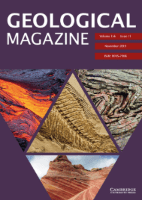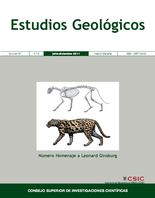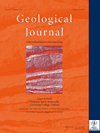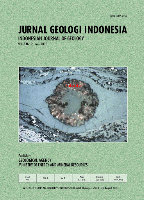
Geologos
Scope & Guideline
Bridging Barriers in Earth and Planetary Sciences
Introduction
Aims and Scopes
- Geochemistry and Geochronology:
The journal frequently publishes studies involving geochemical analyses and isotopic dating methods to understand the age and origin of geological materials, contributing to the broader comprehension of Earth's history. - Environmental Geology and Hydrogeology:
A significant portion of the journal's articles focus on the interactions between geological processes and environmental factors, particularly in relation to groundwater resources, climate change, and pollution, thereby addressing contemporary environmental challenges. - Volcanology and Sedimentology:
Research on volcanic processes, sediment deposition, and their geological implications is a key theme, providing insights into past and present geological activity and its effects on the landscape. - Palaeontology and Palaeoenvironmental Studies:
The journal includes studies on fossil records and ancient environments, enhancing the understanding of biological evolution in relation to geological changes over time. - Geological Mapping and Remote Sensing:
There is a consistent focus on utilizing advanced technologies such as GIS and remote sensing for geological mapping and analysis, promoting innovative methodologies in geosciences.
Trending and Emerging
- Climate Change Impact Studies:
Recent publications increasingly emphasize the geological implications of climate change, exploring topics such as glacial geomorphology and the effects of climate on sedimentation processes, highlighting the relevance of geology in understanding global changes. - Technological Advancements in Geology:
There is a growing trend towards utilizing advanced technologies, such as micro-CT scans and satellite data, for geological investigations, indicating a shift towards more precise and innovative methodologies in geological research. - Geosites and Geoheritage:
An emerging focus on the assessment and promotion of geosites for geotourism and conservation reflects a growing interest in the relationship between geology and cultural heritage, emphasizing the importance of geological features in societal contexts. - Interdisciplinary Research:
The integration of geology with other scientific disciplines, such as biology and environmental science, is gaining momentum, showcasing the interconnectedness of Earth sciences and the need for collaborative approaches to address complex geological challenges.
Declining or Waning
- Traditional Sedimentology:
While sedimentology remains a core area, the focus on traditional sedimentological studies without modern analytical techniques or interdisciplinary approaches is declining, as more researchers seek to integrate geochemistry and geophysics. - Historical Geology:
Themes centered solely on historical geology, particularly those lacking contemporary relevance or application, are becoming less frequent. This shift indicates a preference for studies that connect historical insights with modern geological challenges. - Geological Education and Outreach:
Although educational resources and outreach in geology are important, there has been a noticeable reduction in articles dedicated specifically to educational methodologies or teaching materials, possibly due to a shift towards more research-driven content.
Similar Journals

GEOLOGICAL MAGAZINE
A Legacy of Excellence in Geological ScholarshipGEOLOGICAL MAGAZINE, published by Cambridge University Press, is a premier journal in the field of geology, renowned for its rich legacy since 1864 and ongoing contributions to Earth and Planetary Sciences. With an impressive Q1 ranking in Geology and a Scopus rank of #70 out of 321 journals, it holds a significant position within the academic community, appealing to researchers, professionals, and students alike. The journal covers a wide array of topics, ensuring a comprehensive platform for the dissemination of cutting-edge geological research. Although it does not offer open access, it remains a vital resource for those seeking to stay abreast of advancements in the field. With an enduring commitment to quality, GEOLOGICAL MAGAZINE stands as an essential outlet for scholarly communication and serves as a catalyst for academic discourse within the geological sciences.

ESTUDIOS GEOLOGICOS-MADRID
Connecting Researchers with Earth’s Secrets Since 1976.ESTUDIOS GEOLOGICOS-MADRID is a prominent journal in the field of geology, published by the esteemed Consejo Superior de Investigaciones Científicas (CSIC) in Spain. Established in 1976, this Open Access journal has been a vital resource for researchers and professionals since its inception. With an impact factor reflecting its contribution to the Earth and Planetary Sciences community, ESTUDIOS GEOLOGICOS-MADRID currently holds a Q3 category ranking in Geology as of 2023, showcasing its relevance and quality within the discipline. The journal publishes a diverse array of geological studies, ensuring wide-reaching access to significant research findings, thereby promoting collaboration and knowledge sharing. Established as a platform for both foundational research and applied geology, this journal fosters academic growth and contributes to understanding the Earth’s processes. Researchers, professionals, and students are encouraged to explore its extensive archive, which includes publications from 1976 to the present. For more information, visit the journal's editorial office at Editorial CSIC, C/VITRUVIO 8, 28006 MADRID, SPAIN.

Frontiers of Earth Science
Elevating Earth Science Research to New HeightsFrontiers of Earth Science is a prominent academic journal in the field of Earth and Planetary Sciences, published by Springer. With an ISSN of 2095-0195 and an E-ISSN of 2095-0209, this journal serves as a significant platform for researchers and professionals to disseminate their findings from 2007 to 2024. It is recognized for its impactful contributions within the category of Earth and Planetary Sciences, boasting a respected Q2 ranking in 2023. With a Scopus ranking of 64 out of 195, placing it in the 67th percentile, Frontiers of Earth Science continues to drive academic dialogue and innovation. The journal is dedicated to exploring a diverse range of topics, including geology, meteorology, and environmental science, and amplifying the understanding of Earth systems through rigorous research. Located in New York, USA, this journal embraces an Open Access model, ensuring that groundbreaking research is readily available to the global scientific community, thereby enhancing its accessibility and impact.

GEOLOGICAL JOURNAL
Connecting disciplines to deepen our geological understanding.GEOLOGICAL JOURNAL, an esteemed publication by WILEY, has been at the forefront of geological research since its inception in 1951. With an ISSN of 0072-1050 and E-ISSN of 1099-1034, this journal serves as a vital platform for disseminating high-quality, peer-reviewed research in the field of geology. Operating out of the United Kingdom, the journal proudly features a Scopus rank of 80 out of 321 in the Earth and Planetary Sciences category, reflecting its commitment to scholarly excellence, with a 2023 category quartile ranking of Q2. As part of its innovative approach, GEOLOGICAL JOURNAL seeks to foster interdisciplinary collaborations, advancing our understanding of earth processes, materials, and history. Although it does not offer open access options, its robust subscription model ensures that both professionals and students have access to groundbreaking insights. With a publication history that spans over seven decades, the GEOLOGICAL JOURNAL continues to be an indispensable resource for the global geological community, encouraging discoveries that shape our comprehension of the planet.

Solid Earth Sciences
Transforming knowledge into action for Earth's future.Solid Earth Sciences is a dynamic open-access journal published by Elsevier, dedicated to advancing our understanding of the Earth's subsurface processes and materials. Since its inception in 2016, the journal has established itself as a vital resource for researchers and professionals in the fields of geochemistry, petrology, geology, geophysics, and geotechnical engineering, achieving a notable Q2 ranking in multiple categories as of 2023. With an ISSN of 2451-912X, the journal aims to disseminate high-quality research that enhances knowledge of earth surface processes and the intricate interactions within our planet's systems. The journal is indexed in Scopus, showcasing an impressive rank in various sub-disciplines, with a rank of #96 in Geology and a noteworthy percentile in Earth and Planetary Sciences. Solid Earth Sciences offers a platform for innovative studies, comprehensive methodologies, and cutting-edge technological advancements that cater to a global audience of scientists, academics, and students. With its commitment to open access, it fosters wider dissemination and impact of research outcomes, ensuring that pivotal discoveries reach stakeholders and contribute to real-world applications.

China Geology
Exploring the Depths of Earth SciencesChina Geology, published by KEAI PUBLISHING LTD, is a leading open-access journal that serves as a pivotal platform for disseminating high-quality research across a wide spectrum of Earth sciences. Since its inception in 2018, the journal has rapidly established itself with an impressive Q1 ranking in multiple critical categories, including Geology, Economic Geology, and Oceanography, among others, reflecting its significant contribution to the academic community. Positioned as a top-tier journal in the Earth Planetary Sciences domain, it ranks #22 out of 321 in Geology and exhibits an admirable impact in sub-fields such as Earth-Surface Processes and Geochemistry and Petrology. China Geology is committed to promoting rigorous scientific inquiry and facilitating the open exchange of knowledge in the geosciences, making it an essential resource for researchers, professionals, and students eager to explore innovative developments and fundamental advances in geology. The journal’s accessibility ensures that critical findings reach a broad audience, thereby enhancing collaboration and driving forward scientific discourse in the global community.

Journal of Geosciences
Unveiling the Secrets of Our Planet, One Study at a TimeJournal of Geosciences is a distinguished peer-reviewed journal published by CESKA GEOLOGICKA SPOLECNOST, based in the Czech Republic, that serves as a vital platform for the dissemination of innovative research in the field of Earth and Planetary Sciences. With an ISSN of 1802-6222 and E-ISSN of 1803-1943, this journal has established its significance within the academic community, evidenced by its Q3 ranking in both Earth and Planetary Sciences and Geology. The journal covers a broad array of topics, making it an essential resource for researchers, professionals, and students interested in geoscientific advancements and discoveries. The Journal of Geosciences reflects a commitment to high-quality scholarship, embracing a variety of methodologies and interdisciplinary approaches, and provides open access to its content, thereby encouraging global collaboration and knowledge sharing among geoscientists. With a publication history converging from 2007 to 2024, it continues to be a prominent venue for critical conversations and developments in the ever-evolving field of geosciences.

Indonesian Journal of Geoscience
Exploring Earth's Mysteries, One Study at a Time.Indonesian Journal of Geoscience, published by the GEOLOGICAL AGENCY, is a vital platform for sharing cutting-edge research in the field of Earth and Planetary Sciences. With an ISSN of 2355-9314 and E-ISSN of 2355-9306, this open-access journal has been making significant contributions to the geoscientific community since its establishment in 2013. Operating out of Bandung, Indonesia, the journal is dedicated to disseminating high-quality research across diverse areas, making it an essential resource for researchers, professionals, and students alike. Recognized in the 2023 Q2 category in Earth and Planetary Sciences, it currently ranks #134/195 among general Earth and Planetary Sciences journals in Scopus, reflecting its growing prominence and academic rigor. The journal seeks to foster scientific discussions by publishing original research, reviews, and case studies that address contemporary challenges and advancements in geoscience, thus contributing to a deeper understanding of our planet. With its commitment to open access, the Indonesian Journal of Geoscience ensures that vital research is accessible to a global audience, encouraging collaboration and innovation in the field.

Boletim Paranaense de Geociencias
Fostering Dialogue in Earth and Planetary SciencesBoletim Paranaense de Geociencias, published by UNIV FED PARANA, EDITORA, serves as a vital platform for advancing knowledge in the field of Earth and Planetary Sciences, contributing significantly to discussions surrounding geological research and discovery. With an ISSN of 0067-964X, this esteemed journal primarily features studies that reflect regional geological contexts while also addressing wider planetary science issues. Although it currently holds a Q4 category quartile ranking and a 15th percentile in the Scopus rankings within its field, the journal remains committed to disseminating valuable insights and fostering academic discourse. This is of particular significance as it tirelessly updates its publication scope, aiming to include contributions from diverse geological studies both regionally and globally. While it operates on a printed basis, researchers and students alike will find the Boletim’s progressive discussions critical for understanding the dynamic processes shaping our planet.

DOKLADY EARTH SCIENCES
Advancing Knowledge in Earth and Planetary SciencesDOKLADY EARTH SCIENCES is a reputable journal published by MAIK NAUKA/INTERPERIODICA/SPRINGER, focusing on the dynamic field of Earth and Planetary Sciences. With an ISSN of 1028-334X and E-ISSN 1531-8354, this journal offers a platform for researchers to disseminate their findings and insights that contribute to our understanding of Earth systems over a continuous publishing span from 1998 to 2024. It currently holds a Q3 quartile ranking in the Earth and Planetary Sciences category, reflecting an emerging yet significant impact within its field, evidenced by its Scopus ranks where it stands at 123rd in general Earth sciences and 113th in miscellaneous Earth sciences. DOKLADY EARTH SCIENCES aims to bridge research gaps and foster collaboration among a diverse audience including researchers, professionals, and students committed to advancing knowledge in geoscience. The journal stands as a vital resource for those seeking to explore contemporary challenges and innovations within the realm of Earth sciences.